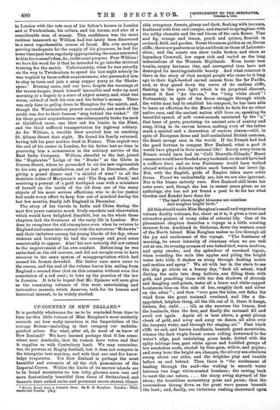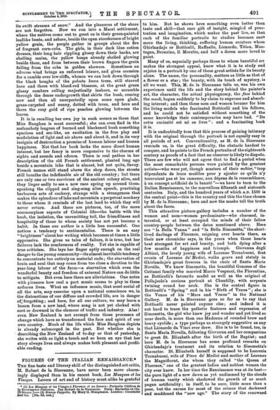UP-COUNTRY IN NEW ZEALAND.*
IT is probably wholesome for us to be reminded from time to time (as this little volume of Miss Baughan's most modestly reminds us) how sadly incurious is the Imperialism of the average Briton—including in that category our undistin- guished selves. For what, after all, do most of us know of New Zealand ? We have learned perhaps that it lies some- where near Australia, that its women have votes, and that it supplies us with Canterbury lamb. We may remember, too, its prowess at Rugby football, but it does not compete in the triangular test matches, and with that our zeal for know- ledge evaporates. Yet New Zealand is perhaps the most beautiful and romantic of all the rich possessions of the Imperial Crown. Within the limits of its narrow islands are to be found mountains no less lofty, glaciers more vast and more fantastically beautiful than those of Switzerland, and beneath their naked rocks and perennial snows stretch illimit- • Brown Bread from a Colonial Oven. By B. E. Baughan. London : Whit- combo and Tombs. 1.68.1 able evergreen forests, glossy and dark, flashing with torrents, feathered with fern and creeper, and starred in springtime with the milky clematis and the red bloom of the rata flower. Vine and fig, orange and lemon, peach and quince, flourish in orchard, field, and garden. Gorse blooms as golden as on Devon cliffs ; there are pastures as trim and fresh as those of Leicester- shire; and the coasts can show rocks broken and stern as legendary Cornwall, low capes rich and varied as the long indentations of the Western Highlands. Even burnt tree trunks, empty kerosene tins, and corrugated iron have not destroyed its inextinguishable beauty. And what romance is there in the story of that ancient people who came to it long ago in their high-beaked carved canoes from the far Pacific, and, as they gazed down the curve of its endless cliffs, flashing in the pure light which is its perpetual element, named it first " Ao tea-roa," the "long white cloud " ! Fortunately, in spite of the fierce struggle through which the white man had to establish his conquest, he has been able to learn an affection for the Maori which be feels for no other native race, and the ancient nation still lives on, speaking its beautiful speech of soft vowel-sounds untainted by the "s," that bane of poets, practising its ancient arts of oratory and song, living in its carven houses, making even of the tattoo mark a symbol and a decoration of curious charm—still, in spite of European dress and half-assimilated British customs, the finest savage race in the world. If the French had had the good fortune to conquer New Zealand, what a part it would have played in their national life ! Surely every town in France would have bad its " Cafe Nouvelle-Zelande," Maori romances would have flooded every bookstall, we should have had a coiffure kiwi, and no true Parisienne would have walked abroad without a delicate tattoo mark beneath her lower lip. But, with the English, pride of Empire takes more sober forms. Proud we undoubtedly are, but we are also ignorant. Nor is the blame entirely ours. New Zealand still lacks her rates sacer, and, though she has in recent years given us an anthology, she has not yet found a poet to do for her what Gordon and Kendal have done for
" The land where bright blossoms are scentless And songless bright birds."
All this should make Miss Baughan's small and unpretentious volume doubly welcome, for, short as it is, it gives a true and attractive picture of many sides of colonial life. One of its pleasantest chapters describes a voyage in a little coasting steamer from Auckland to Gisborne, down the western coast of the North island. Miss Baughan makes us live through all the joy and excitement of the voyage. " The freshness of morning, its sweet intensity of clearness when we are well out at sea, its evening aromas of sun-baked turf, warm tauhinu, and spicy smoke; and the splendour of unreined vigour, when rounding the sails like apples and piling the bright water into hills, it dashes us along through dashing music and motion and spray." We sit with her in the stern to see the ship go about on a breezy day, "deck all aslant, wind dinting the sails into deep hollows, sun filling them with gold, and pencilling them with the dun shadows of shrouds and dangling reef-points, water all a brave and white-capped boisterous blue on this side of her, roughly dark and silver on the other " ; and then "over goes the helm, out fades the wind from the great mainsail overhead, and like a dis- appointed, helpless thing, all the life out of it, there it bangs, listless, flat, unlit . . . till, as she recovers the breeze, first the headsails, then the fore, and finally the mainsail fill and swell out again. Again all is taut above, a great plump cheek of gold, and away and away we dance, all alive over the buoyant water, and through the singing air." Past black cliffs we sail, and barren headlands, beneath great mountains, whence the dark virgin forest comes rolling downward to the water's edge, past undulating grass lands, dotted with the spiky cabbage tree, past white spires and huddled groups of low smokeless roofs, shaded by blue-gum, willow, and poplar; and every hour the bright sea changes, the silvery sea-swallows swoop about our sides, and the dolphins play and tumble before us and behind. Then there is "the excitement of landing through the surf—the waiting in smooth water between two huge white-crested breakers ; the rowing back to meet the one astern, . . . the sharp swing skyward of the stern; the breathless momentary poise and pause; then the tremendous thump down as the great wave passes beneath the boat; and, finally, our victorious rushing shoreward upon
its swift streams of snow." And the pleasures of the shore are not forgotten. Now we run into a Maori settlement, where the natives come out to greet us in their green-painted leaflike boats, and ashore, beside the open storehouses of bright yellow grain, the people gather in groups about the fire of fragrant corn-cobs. The girls, in their dark blue cotton dresses, their long hair rippling glossy down their backs, are shelling maize, the yellow heaps already shelled glowing beside them, and from between their brown fingers the grain falling from the cobs in golden showers. Sometimes an adverse wind brings an enforced leisure, and gives occasion for a ramble over low cliffs, whence we can look down through the black boughs of the pohulu kawa trees, still starred here and there with blood-red blossom, at the great green glassy combers rolling majestically inshore, or scramble through the dense undergrowth that skirts the bush, coming now and then all unexpectedly upon some open glade, grass-carpeted and sunny, dotted with trees, and here and there the rosy gold of ripe peaches glowing between the leaves.
It is in recalling her own joy in such scenes as these that Miss Baughan is most successful ; she can even find in the melancholy leagues of burned and blackened bush something spacious and sea-like, an exultation in the free play and modulation of light and air above and about it, and in its very insignia of destruction a promise of human labour and human happiness. Not that her book lacks the more direct human interest., but her fancy is more responsive to the charms of sights and sounds and odours. There is real pathos in her description of the old French settlement, planted long ago beside a mountain lake that is almost, but not quite, Savoy. French names still stand above the shop doors, the streets still breathe the indefinable air of the old country ; but there are only one or two survivors of the ancient colony alive, and they linger sadly to see a new race spring up around them, speaking the clipped and sing-song alien speech, practising barbarous arts of cookery, strange with a strangeness that makes the splendour of lake and mountain a perpetual mockery to those whom it reminds of the lost land to which they will never return. And there are pictures, too, of the more commonplace aspects of Colonial life—the battle with the bush, the isolation, the unremitting toil, the friendliness and hospitality of those to whom society has not yet become a habit. In these our author is a little less successful. One notices a tendency to sentimentalize. There is an easy " brightness" about her writing which becomes at times a little oppressive. She gives us tales of failure, it is true, but her failures lack the sombreness of reality. Yet she is capable of true criticism. She lays her finger aptly enough on the real danger to the young community—its almost inevitable tendency to concentrate too entirely on material ends ; the starvation of brain and soul that may come from too close a devotion to the year-long labour of the farm—a starvation which even the wonderful beauty and freedom of external Nature can do little to mitigate. But even here there are alleviations. One notes with pleasure how real a part music seems to play in these arduous lives. What an influence music, that most social of all the arts, may exercise upon a national conscience we, in the distractions of our diffuse and crowded life, are in danger of forgetting ; and here, for all our culture, we may learn a lesson from a new land, where song is not yet choked with soot or drowned in the clamour of traffic and industry. Alas ! even New Zealand is not exempt from those processes of change which have so transformed the face and spirit of our own country. Much of the life which Miss Baughan depicts is already submerged in the past. But whether she is • describing the New Zealand of to-day or that of yesterday, she writes with so light a touch and so keen an eye that her story always lives and always makes both pleasant and profit- able reading.



































































 Previous page
Previous page